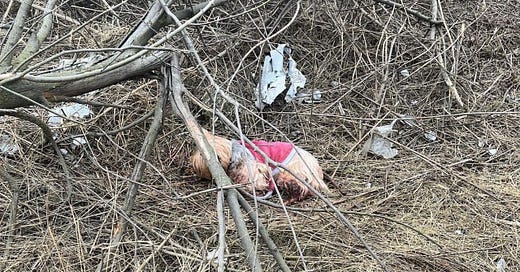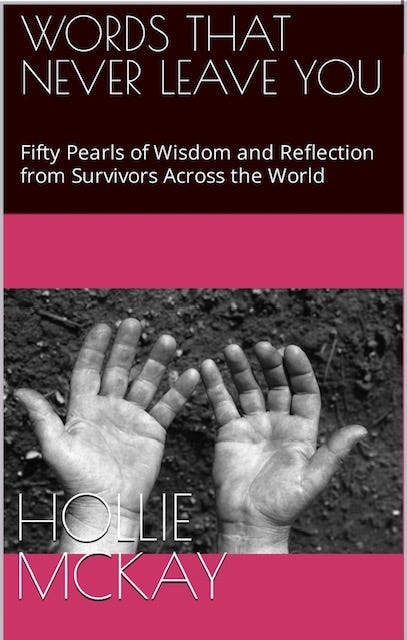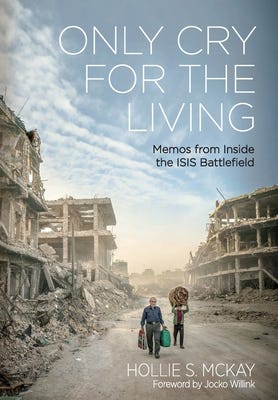This is why we care more about animals suffering in conflict than humans
The image of a wounded animal can do more than an article detailing civilians caught in the crossfire
In the immediate aftermath of Russia's invasion of Ukraine in the winter of 2022, I found myself amidst Moscow's indiscriminate bombardment while working at a rescue site. The scene unfolded as distraught Ukrainians emerged into daylight after days spent cowering in basements – injured, terrified, starving, and confused.
The ominous rumbling in the grey sky intensified, prompting a sudden rush for safety. A medic friend urgently grabbed my elbow, urging me to run. As I turned to move, my attention was drawn to a bleeding little dog trembling beside a bridge. Despite the urgency, I couldn't leave the injured dog behind. Much like in America, pets hold a significant place in the Ukrainian family fabric.
The medic insisted, "Hollie, Hollie, no no no," grabbing my elbow. Wincingly, I quickly captured a photo of the dog and continued running, my heart torn between the pain and emotion of the moment.
Later, I shared the picture on Instagram, depicting the shaking, blood-stained pet as a poignant reminder of the impact of war. Of all the stories shared during the initial phase of the conflict, none elicited a stronger reaction than a single Instagram post featuring a beautiful, frightened canine beneath a blown-up bridge. There is something about the vulnerability of animals that resonates deeply, speaking to our sense of right and wrong. My inbox flooded with messages, the photo was widely shared, and people continued reaching out for days to inquire about the dog's fate. Tragically, the puppy's entire family, except for the absent father, fell victim to a Russian strike during the rescue mission a day earlier.
Fortunately, there was a silver lining: a photographer later rescued the dog, reuniting it with its one surviving owner. Still, I couldn't shake the question of why the plight of this animal generated more outrage than the suffering of humans, especially adults. It raises questions about the factors driving our empathy and the disparities in our responses to animal and human struggles during conflicts.
The emotional response to the Ukrainian dog reminded me of the widespread outrage when zoo workers shot the beloved lowland gorilla Harambe in 2016. Despite other significant news stories like hundreds drowning in the Mediterranean Sea and the 64 people shot dead in Chicago over Memorial Weekend, the coverage of Harambe dominated the news cycle and induced strong reactions across the World Wide Web.
Several factors may explain why some people care more about animals than humans. Animals are often perceived as innocent and vulnerable, evoking strong emotions. Some individuals feel deeply connected to animals due to personal beliefs or experiences. Animals, seen as vulnerable beings without control over their fate, elicit compassion in a way that humans, perceived to have some control, may not.
A study conducted by a Professor of Sociology at Northeastern University explored people's reactions to fictitious news stories covering attacks on a human baby, puppy, adult dog, and adult male. Participants expressed more distress over non-human victimization, except when a human child experienced the suffering. The adult male received the least sympathy. The study suggested that a combination of vulnerability and similarity to oneself provoked the most empathy.
Moreover, Western media's tendency to avoid graphic images of human suffering could also contribute to the heightened emotional response to animal suffering. The rules governing the portrayal of animals in media are less stringent, leading to a more overwhelming reaction. When we can see something so raw, it becomes so real that we cannot turn away.
However, human sympathy toward animals may depend on the type of animal in question. While over 10 billion animals are killed for meat annually, and around 100 million are killed through recreational hunting, which more than three quarters of Americans condone for reasons ranging from conservation to food supply, Americans overwhelmingly consider their dogs and cats as family members – as important as any human. Most of us would pay whatever we could to ensure the health and safety of our much-loved canine or feline, just as we would our children. Thus, in my view, pets and exotic animals seem to conjure up the most emotional reaction in the face of wrongdoing.
The bottom line is that in some circumstances, it appears that we value animals over people, although caring for animals does not necessarily equate to caring less for humans. But from a war reporter's perspective, shedding light on animal suffering does something that no words or human picture can: it makes far-flung conflicts incredibly real, points to a universal frame of reference and reminds us how the most innocent of all are too often caught in the crossfire.
PLEASE CONSIDER A PAID SUBSCRIPTION TO THIS SUBSTACK TO HELP KEEP INDEPENDENT WRITING AND JOURNALISM ALIVE. THANK YOU SO MUCH FOR YOUR SUPPORT.
For speaking queries please contact meta@metaspeakers.org
For ghostwriting, personalized mentoring or other writing/work-related queries please contact hollie@holliemckay.com
HOLLIE’S BOOKS (please leave a review)
** Short read of meaningful lessons gleaned from the ordinary forced to become extraordinary
Order your copy of “Afghanistan: The End of the US Footprint and the Rise of the Taliban Rule” out now.
For those interested in learning more about the aftermath of war, please pick up a copy of my book “Only Cry for the Living: Memos from Inside the ISIS Battlefield.”
If you want to support small businesses:








Two years ago our beloved Maltipoo passed away. I felt depressed and melancholy for months … and even now he is still missed, and we still have not yet gotten another pup. I had to even question my mood any number of times, because I felt like I was mourning more for a passed away pet than I have for people, including fellow colleagues, friends and even family.
Last year, I read an insightful book titled “Rescuing Sprite: A Dog Lover's Story of Joy and Anguish” by author and broadcaster Mark Levin. The main point I came to understand is that our pets, for the most part, love us unconditionally. If you are a dog or cat owner and you are a loving and caring owner to your pet, your critter will reciprocate unconditionally. Fellow humans, as much as we love and cherish our friends and family, can frequently disappoint, hurt or even betray us from time to time. Faithful pets rarely do this … if ever.
There is an old political adage in Washington, D.C. that goes something like … if you want a friend while you’re in politics, then get a dog. The explanation to the outpouring of sympathy for the photo follows this line of reasoning in that cliched adage.
Anyways … I also believe that a reason why you had so much sympathetic feedback for your Ukrainian war pup is because those people are relating the poor pooch to their own beloved pets. It doesn’t mean that they are more cold and callous towards the human sufferings during war. But the scared and hurt pup really brings home the tragedy of war because so many people likely have or have had a pet similar to the one in your photo.
In the meantime, that was a great write-up. Bravo Zulu.
Here is a link for more about that Mark Levin book: https://www.goodreads.com/book/show/994192.Rescuing_Sprite
I think another factor is most people have been at one point or another deeply wounded by another person whereas most people have nothing but fairly positive experiences with animals. That wounded man brings to mind memories of an absent father or abusive ex, but a dog or cat has none of that baggage.